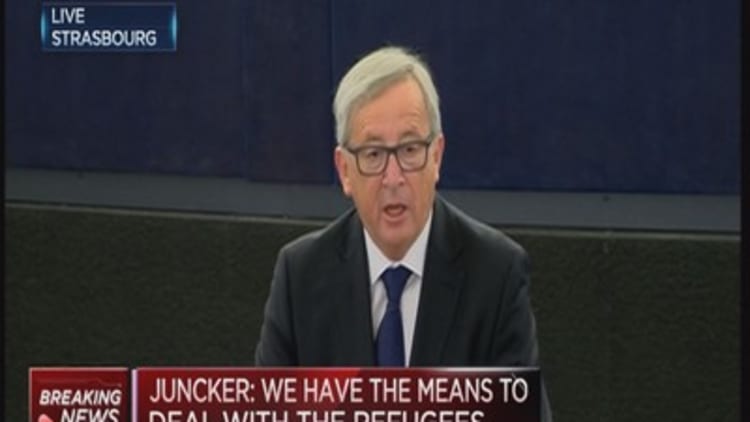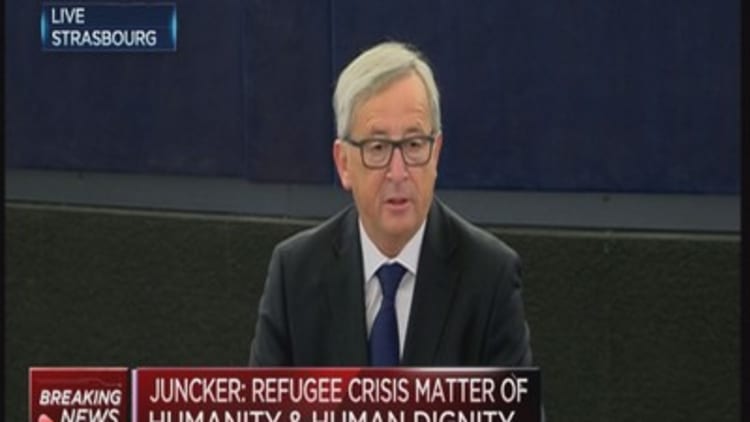


Concerns over the thousands of refugees entering Europe might have reached fever pitch, but many European politicians believe the newcomers are just what a rapidly aging Europe needs to thrive.
For the last week, images of thousands of migrants making their way northward through Europe on foot and rail have dominated the media, with scuffles between migrants and police illustrating the rising tensions and increasing struggles the authorities are facing against such an influx of people.
In a bid to alleviate the strain on countries like Greece, Hungary and Italy where many migrants, mainly from Syria in the Middle East and Africa, have arrived, plans for a compulsory quota system to relocate up to 160,000 migrants have been proposed.
Read More
The proposal has prompted divisions between European governments and the public alike, however. On Friday, the Czech Republic's finance minister told CNBC that he wanted to see the Schengen area in Europe—comprised of 26 countries which have abolished border checks—to be closed in order to stem the flow of asylum seekers.
However, other countries including Germany, Finland, Lithuania and Sweden are seeing an opportunity in the arrivals against a backdrop of increasingly aging populations in their home countries. Such demographic changes put pressures on economies as the number of working people decline just as the number of retired workers (depending on those young workers) increases.
The European Commission states on its website that aging "is one of the greatest social and economic challenges of the 21st century for European societies. It will affect all EU countries and most policy areas."
In its latest aging report, for instance, the commission forecast that Germany's population will shrink from 81.3 million in 2013 to 70.8 million in 2060—meaning that the Europe's largest economy could do well to accept migrants of working age. Indeed, the country's vice chancellor said this week that Germany could take in 500,000 migrants each year "for several years."
Read MoreIslamic State the top threat in migrant crisis: Czech FinMin
In addition to solving the problem of aging native populations, Swedish Finance Minister Magdalena Andersson told CNBC on Friday that migrants help Europe boost economic growth and job creation.
"It's important that we see that we do have families of working age coming to the Continent which is an aging continent," she told CNBC in Luxembourg where finance ministers have gathered for the latest economic council.
"Of course, it would put some strains on the public finances in the short term but in the long run this could promote growth and job creation in Europe. We truly have a demographic challenge on this continent and having asylum seekers could be a good thing."
"If we are able to help these people get onto the labor market and start working it will lead to higher growth for Europe as a whole."
Read MoreHow smartphones are helping refugees in Europe
Speaking to reporters ahead of the meeting of European finance ministers Friday, Lithuanian Finance Minister Rimantas Šadžius also expressed optimism that migrants could benefit Europe and his own country.
"I think it is in our common interest to make some use of the situation, to make the best for us and the people coming into Europe—however harsh that may seem to say," he said. "We can make use of this situation for enhancing our economic capacity," Šadžius added.
The European Commission estimates that by 2025 more than 20 percent of Europeans will be 65 or over, with a particularly rapid increase in numbers of over-80s putting more pressures on health-care provision and social services throughout the region.
But while governments might recognize the benefits of migrants for their workforces, public opinion is split on whether to embrace migrants given the social, economic and cultural challenges migration can pose.
At a news conference following the meeting of European finance ministers and central bankers in Luxembourg on Friday where migration matters trumped the rest of the subjects on the agenda, Pierre Moscovici, European commissioner for economic and financial affairs, urged the public to look beyond the migrant crisis just in terms of cost, however.
"(Migration) is not just a cost in economic terms, it is also a resource—a human resource. Our countries need migration ... the economic impact should not just be looked at in a negative way as populists would have it."


